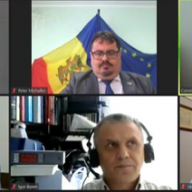Project closing conference – EU perceptions and realities in Moldova (WE&EU)

On 01 July 2020 the virtual format of the concluding conference of the project “EU Perceptions and Reality in Moldova” (WE&EU) was successfully held. This public event was attended by high-ranking representatives such as the German Ambassador, Mrs. Angela Ganninger and the Head of the EU Delegation, Ambassador Peter Michalko, as well as numerous participants from previous project events. In addition, about 16,500 citizens from all over Moldova followed the presentation and final discussion of the results of the project conducted by the Institut für Europäische Politik (IEP) in cooperation with the Institute for European Policies and Reforms (IPRE) and the Institute for Strategic Initiatives (IPIS). The public final conference allowed a review of the project activities (Citizen dialogues, EU awareness workshops, fact checks, videos on EU success stories) and a summarised presentation of the collected findings, which allowed conclusions for the future.
The opening session confirmed the relevance of the project for Moldova’s EU approximation process. In her video message, the German Ambassador to the Republic of Moldova, Mrs. Angela Ganninger, emphasised that trustful cooperation and successful partnership required mutual knowledge and understanding. IEP Director Dr. Funda Tekin pointed out that the beginning of the German EU Presidency was also an opportunity to promote common interests within the EU and in the Eastern neighbourhood.
The first panel dealt with EU support for Moldova under the current crisis conditions and in the recent past. Ambassador Michalko underlined that a substantial support package has been put in place by the EU to mitigate the negative effects of the COVID-19 pandemic. While the first EU aid tranche was provided unconditionally, the second aid package was conditional. Recent surveys show that Moldovan citizens are increasingly aware of EU support, and the WE&EU project has contributed to this rising awareness. The representative of the Moldovan Foreign Ministry, Ambassador Andrej Popov, emphasized that despite these positive figures, there is still a pronounced scepticism among large parts of the Moldovan population regarding the EU rapprochement. Dialogue must continue to be sought in this context in order to counter the spread of myths. Iulian Groza, Director of IPRE, stressed that the EU should develop better and coordinated communication strategies, especially with the help of the reform minded civil society.
After a short break, during which two videos (Successful story “We and the EU”. Ina Negrua, entrepreneur from Orhei; The success story of Grigory Kiss) on success stories of EU funding were shown, the second panel focused on the concrete perceptions of the population at local level regarding the EU-Moldova relations.
The mayors Anatolii Topal (Ceadir-Lunga) and Constantin Cojocaru (Edinet) stressed the importance of EU support in the fields of agriculture, environment and infrastructure, which has led to an increase in living standards in rural areas of Moldova. With regard to the perception of this connection within the population, they summed up that more and more people would associate projects with the EU, but that this depended heavily on communication, transparency and success of these projects. According to IPIS Director Vadim Pristrinciuc, the fact-checks initiated by the project, as well as videos of success stories, were an important contribution to this process. In addition, the administrative management structure and the distribution of EU aid should be further decentralised.
The future challenge is to make the often complex issues of the necessary reform processes and accessibility to project funding easier to understand for many citizens, so that all social forces feel better integrated in the process of EU rapprochement.
Both panels concluded with a question and answer session. Overall, the discussions at the final conference generated a very high public response, which underlines the relevance of the topic.
The project “WE&EU: EU Associations and Reality in Moldova” aims to make a significant contribution to overcoming the social divisions in Moldova in relation to the EU approximation process by promoting an informed intra-societal dialogue on the specific content and fundamental values of the Association Agreement and the concrete benefits of the modernisation of Moldova in the course of the EU approximation process. The project activities between July 2019 and June 2020 include civil dialogue, workshops, public conferences and TV debates in diverse regions such as Basarabeasca, Orhei, Nisporeni and Ungheni.
The project is kindly supported by the German Federal Foreign Office.
More information on the project can be found here.






